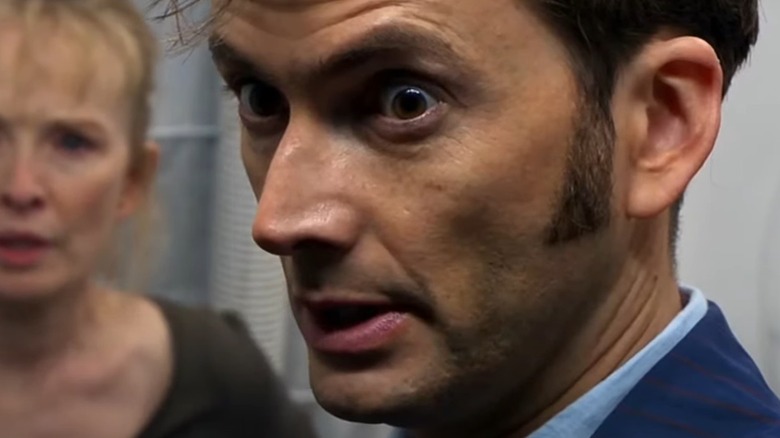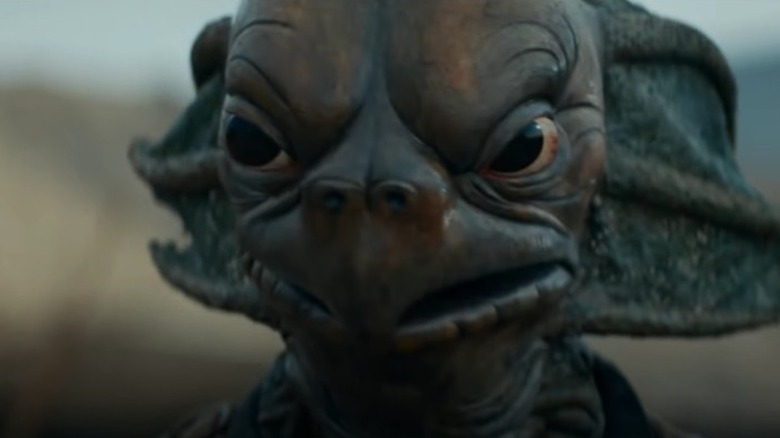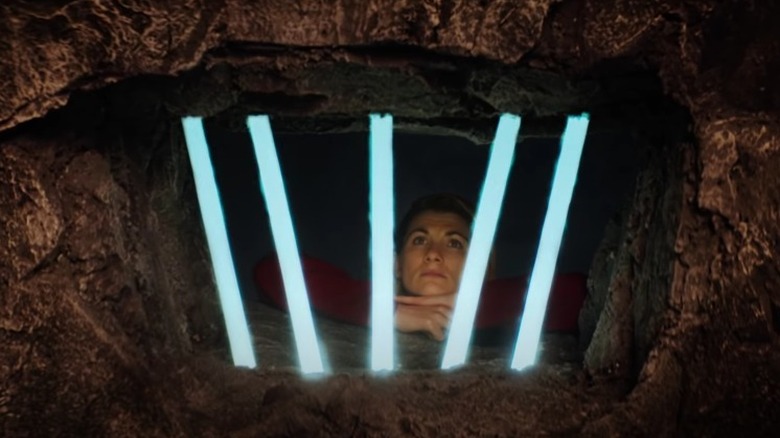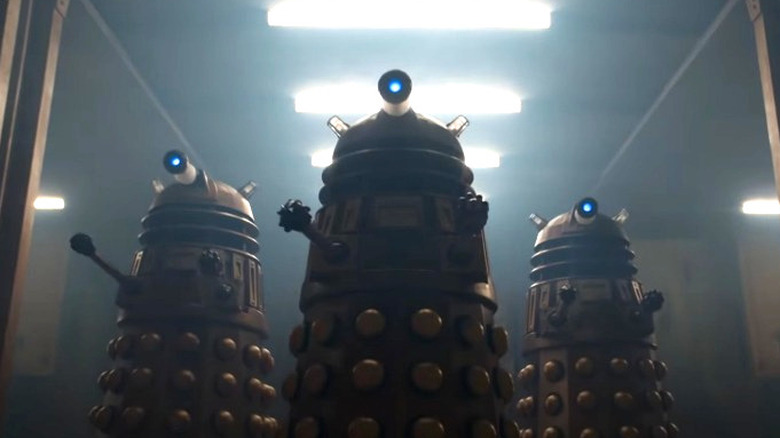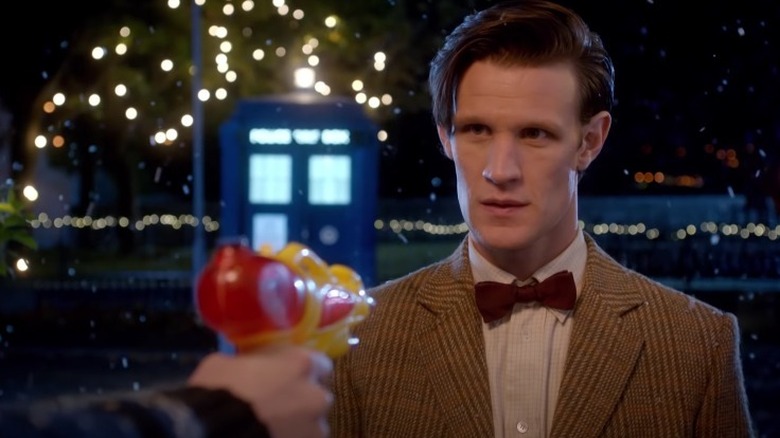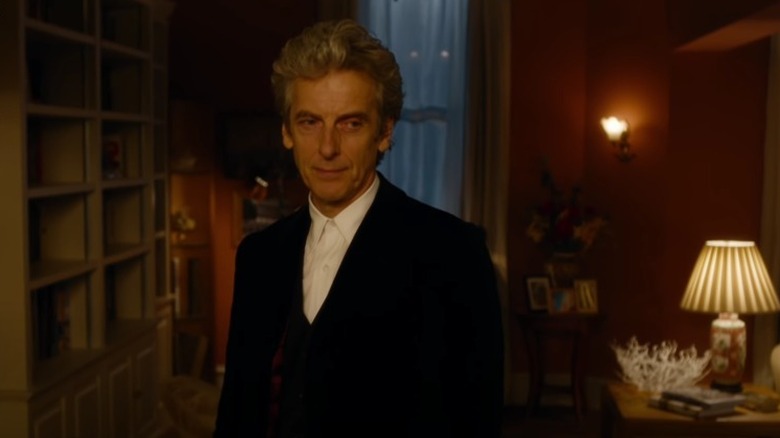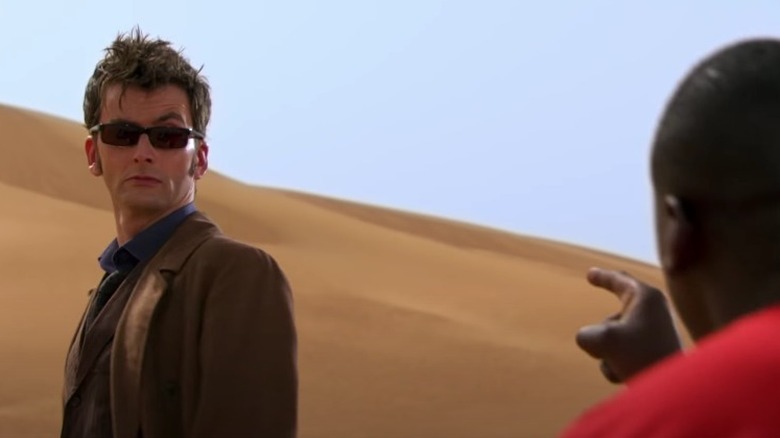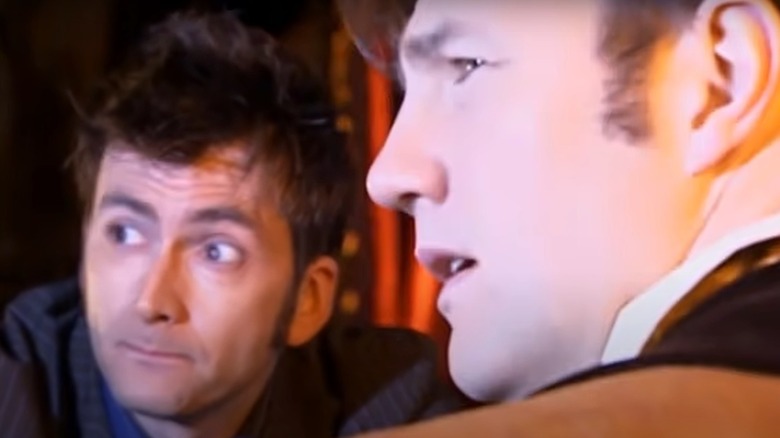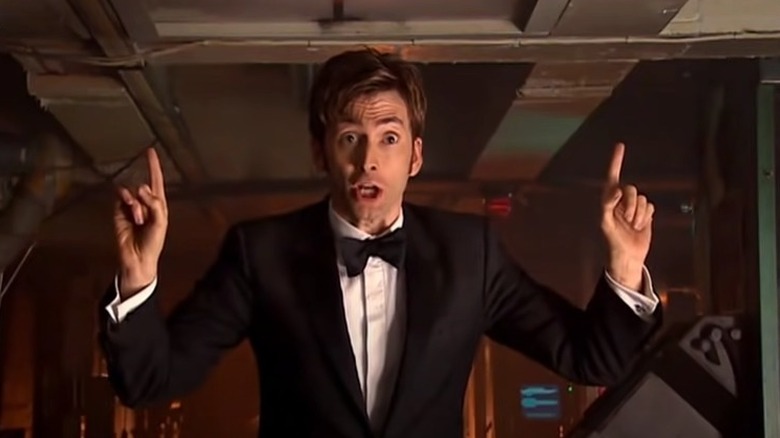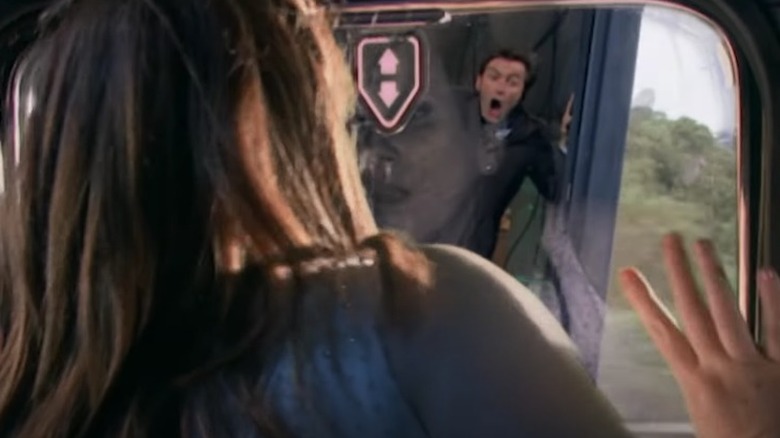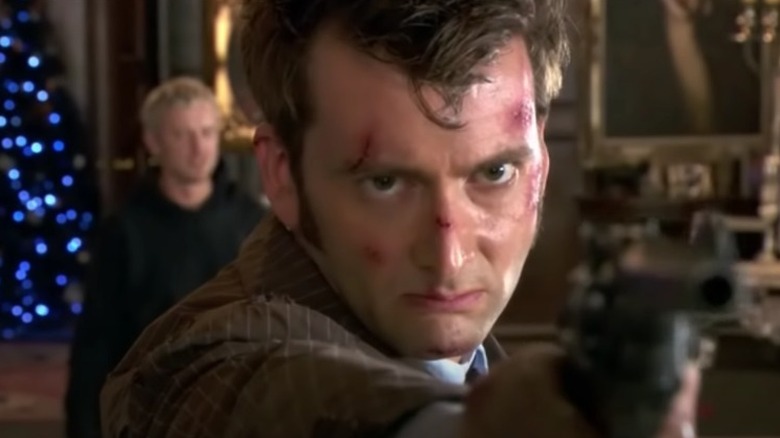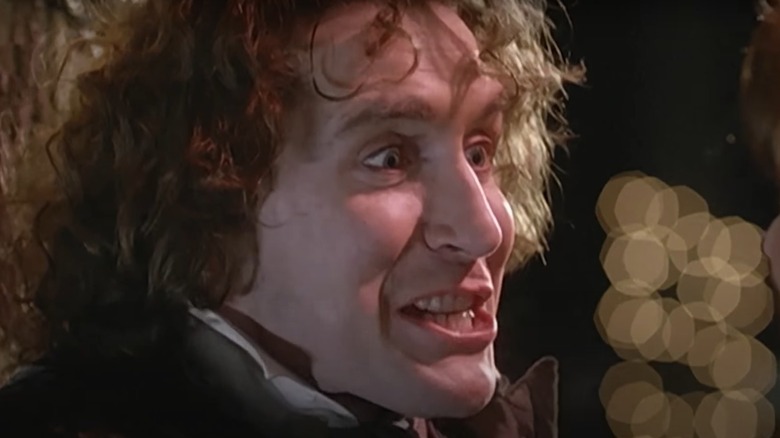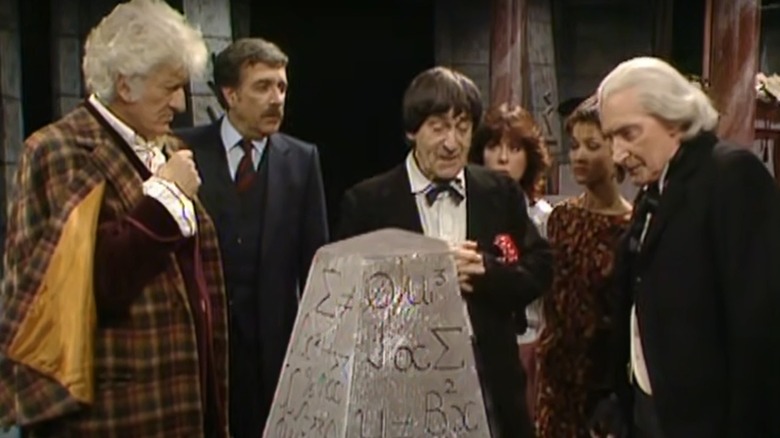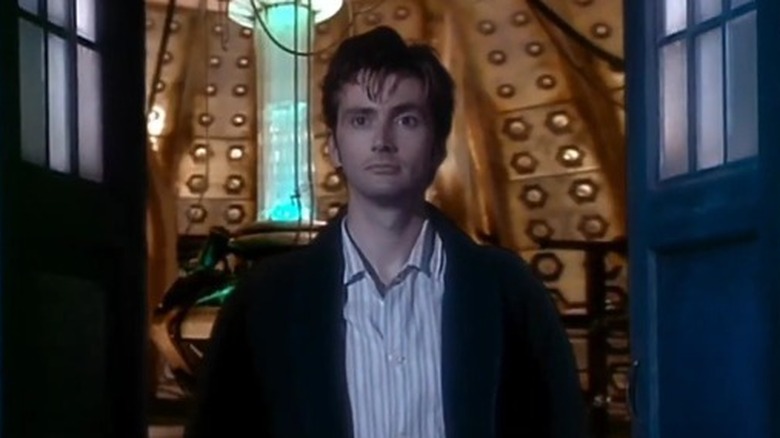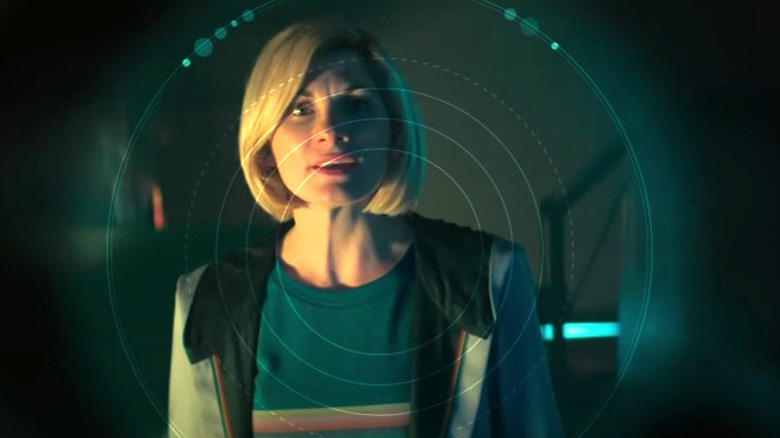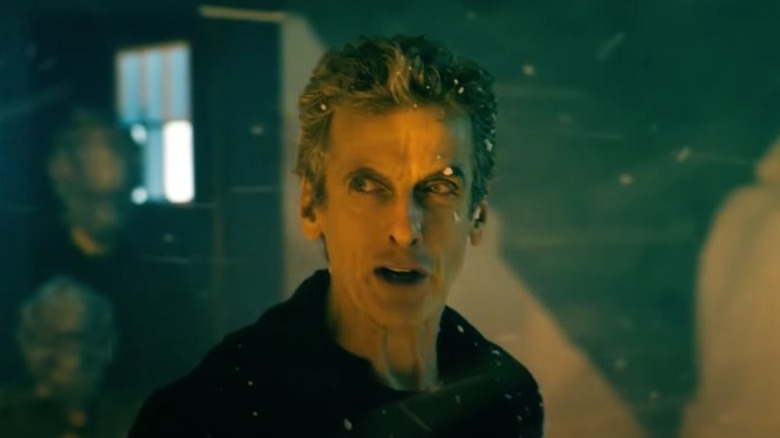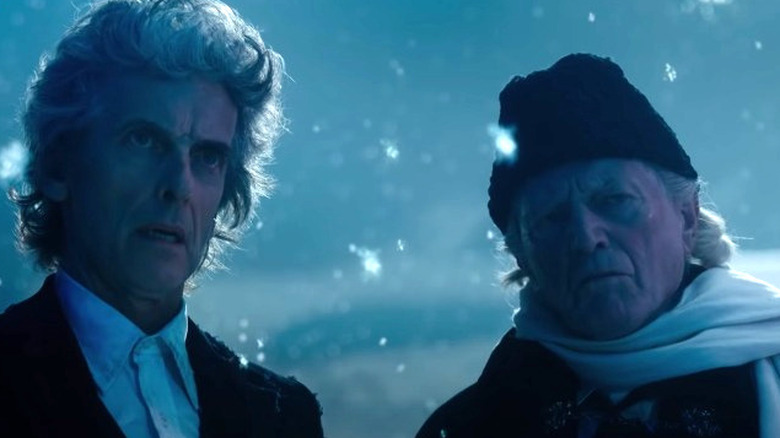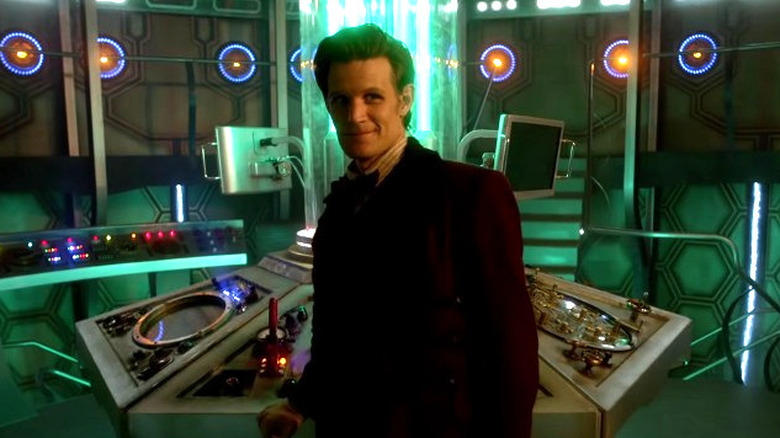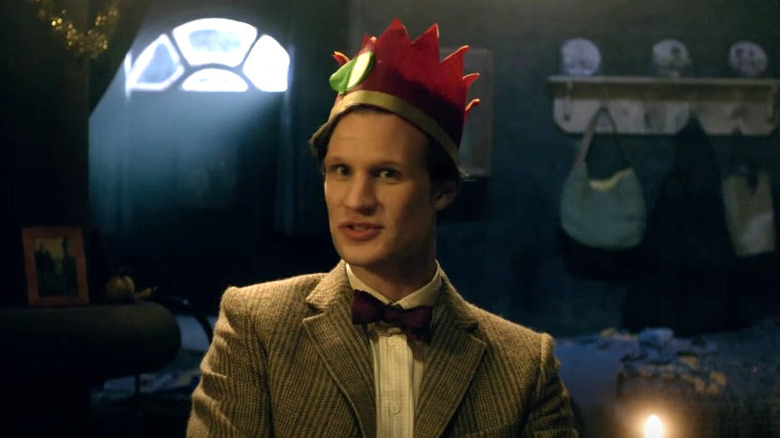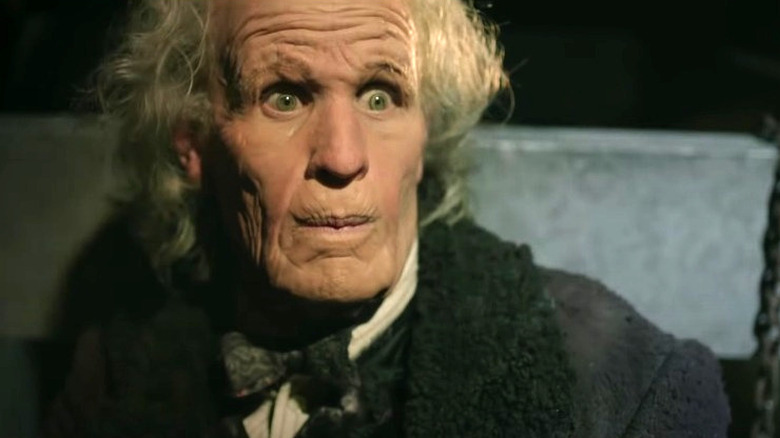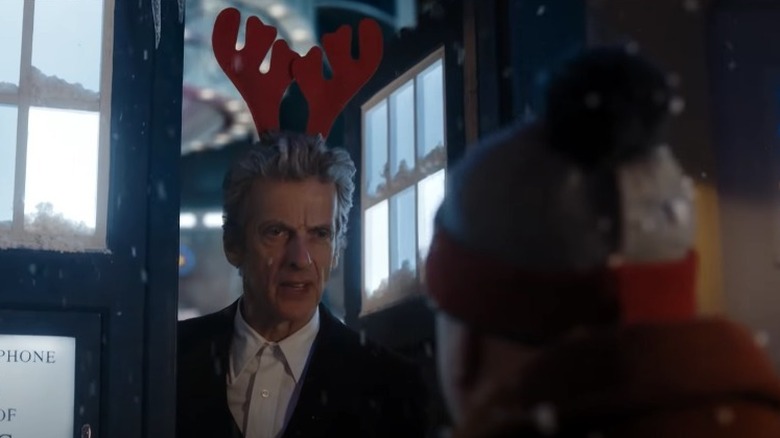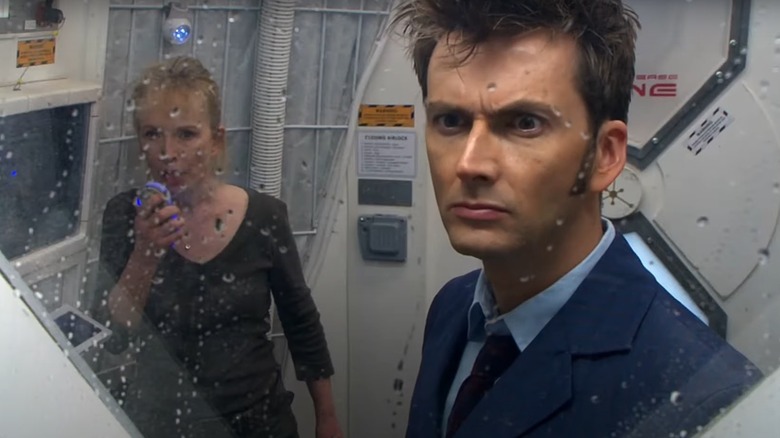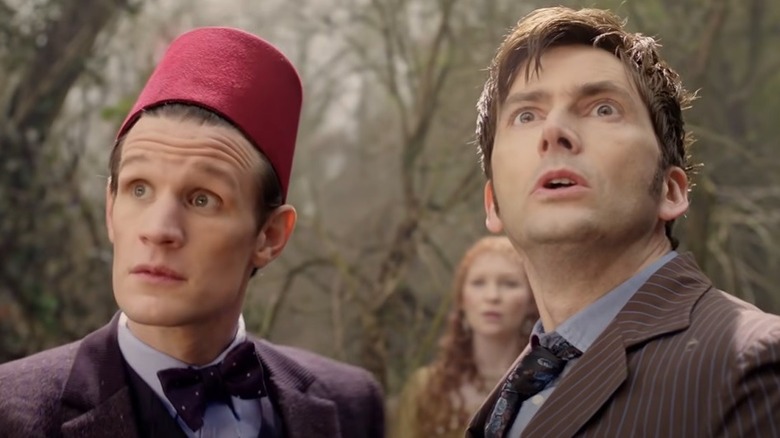Every Doctor Who Special Ranked
"Doctor Who" holiday and anniversary specials are like their own little movies, often serving as a boisterous cap to a season or a jumping off point for a new Doctor. Occasionally, they exist specifically to honor the enormous legacy of the series, a British institution and a favorite among sci-fi fans the world over. Whatever their purpose, it's always exciting for "Doctor Who" fans when a new special arrives.
Today, we're looking back at every "Doctor Who" special and ranking the lot. From the famous Christmas and New Year specials of the Jodie Whittaker era to David Tennant's final four stories, we're covering them all. That means going back to the classic era of the series to include the feature-length anniversary special "The Five Doctors." "The Three Doctors," however, will not be included, as it was part of a regular season run. Nor will the "Spyfall" two-parter, as it was a season premiere and had nothing to do with the holiday it happened to air on. Finally, "K-9 and Company" will also not be featured, since it was an attempted spinoff.
With the disclaimers out of the way, it's time to jump in the TARDIS and revisit all the "Doctor Who" specials.
Legend of the Sea Devils
After "Flux," the six-part epic that was the 13th season of "Doctor Who," three specials were produced, bridging the gap between the finale and Season 14. Perhaps the most exciting-looking of those specials was released on Easter Sunday, titled "Legend of the Sea Devils." The trailer made it look absolutely epic, like nothing we'd really seen in the series before. It featured the return of a classic species, and Jodie Whittaker was set to regenerate in the next story, so it seemed as though this was going to be her last go at a fun, over-the-top storyline before having to say goodbye properly. It had "crowd pleaser" written all over it, so what went wrong?
The Doctor traveling to 19th century China and encountering a fierce pirate queen sounds great in theory, but the execution is poor. Plot points occur with no set-up, characters are abandoned out of nowhere, motivations are unclear, and none of it is very cohesive. Sol colorful and neat to look at, but most of it is on the dull side, lacking any genuine tension. There's some nice moments between the Doctor and Yaz, but even those are undercooked. If you're a big Whovian then you'll want to see it at least once, but casual viewers might want to give "Legend of the Sea Devils" a wide berth.
Revolution of the Daleks
"Revolution of the Daleks" is the second installment in an unofficial Dalek trilogy. It began with "Resolution" in 2019 and concluded (more or less) with "Eve of the Daleks" in 2022. This middle chapter isn't quite as taut and focused as the others, but all the Dalek action is solid. Greedy opportunists think they can turn the famous villains into their own law enforcement unit in this story. As viewers, we're just waiting for things to go wrong. When they do, the result is absolute Dalek mayhem, with people being exterminated left and right with zero remorse.
These Daleks are all business. They are quick, lethal, and frightening — just as Daleks should be. If only the rest of this special could have been as entertaining. Captain Jack Harkness is back to help the Doctor escape from prison. It should have been a great moment, but it goes by so quickly that we barely have the chance to enjoy it. Seeing Jack with the Doctor again and meeting her new friends is a nice way of connecting this era of the show to what came before, even if the story is more interested in keeping things moving than evoking nostalgia.
Eve of the Daleks
The New Year special "Eve of the Daleks" is a time loop story featuring the Doctor, Yaz, and Dan. They get trapped in a storage facility with an employee, a customer who has a crush on said employee, and some Daleks. Seeing fleets of Dalek ships fill the sky as they invade a planet is undeniably cool, but having them rolling around a mundane concrete building at night is pure "Doctor Who."
Although the plot is about a group of people being murdered by Daleks over and over again, the story is actually about unspoken love. Adjani Salmon plays Nick, who is head over heels for Sarah, played by Aisling Bea. The problem is he's too nervous to tell her how he feels. At the same time, Yaz is grappling with her own feelings for the Doctor, and Dan thinks she should just speak up.
Resetting the timeline is a great way of reminding the audience that they have to take chances in life. Sure, these characters get multiple do-overs, but even the time loop is running out. They have to act and express their true feelings before it's too late. It isn't a brilliant, life-changing, piece of drama, but it's fun holiday viewing.
The Doctor, The Widow, and the Wardrobe
"The Doctor, the Widow, and the Wardrobe" begins with a completely nonsensical cold open featuring the Doctor hurtling through space on his way to catch a spacesuit. An initial rush of excitement quickly fades as questions pop into your mind. How is he able to survive the vacuum of space? He's an alien, sure, but he's breathing, panting, and yelling. How is any of that possible? Is the TARDIS nearby with its magical oxygen tunnel?
The opening is a sign of things to come. There's a lot of incredible imagery, but none of it has any real impact. Christmas-themed things are thrown into the story to remind you it's a holiday special rather than for any narrative reason. Also, the Doctor constantly reminds us these things are cool by remarking so out loud. Instead of allowing us to take in the concepts and draw our own conclusions, the show's titular character literally tells us how to feel about it.
The best part of "The Doctor, The Widow, and the Wardrobe" is the ending. When the Doctor shows up at Amy and Rory's home and they invite him in for dinner, we see the Doctor cry happy tears. If you're still engaged by the time the ending comes around, it will kick the legs right out from under you.
The Return of Doctor Mysterio
"Doctor Who" stepped into superhero territory with its 2016 Christmas special "The Return of Doctor Mysterio." While meeting the Doctor on Christmas Eve as a boy, comic book super-fan Grant ingests an alien gem that gives powers and abilities similar to that of Superman. As an adult, he works for his childhood crush as a nanny while moonlighting as the Ghost, a masked vigilante. It's the Doctor's job to see that the alien threat gets handled properly and that Grant's love life gets sorted out.
There's a few standout moments, but this romp of a special is rather forgettable. We get some superhero action, some romance, the Doctor being awkward (which is always nice), and Nardole (Matt Lucas) being Nardole, though if this were a normal episode in the middle of a regular season, it would no doubt be the black sheep. Sure, it commits to its unusual premise with real gusto, but it never really hits the mark.
Of course, that's not exactly unusual. Unless they're being used to introduce a new character or say goodbye to a beloved one, Christmas specials often lean on spectacle over substance. The one thing "The Return of Doctor Mysterio" has in its favor is that it's never boring.
Planet of the Dead
In "Planet of the Dead," the Doctor finds himself on a bus that passes through a wormhole to a desert planet. The sands are made up of dead people, hence the title of this disappointing special. Other than the ending, where the Doctor learns that his time is coming to an end, not a lot happens. There's a potential new companion, a thief named Lady Christina de Souza (Michelle Ryan), but she's just there to get rejected by the Doctor to demonstrate how much the departure of Donna scarred him. A young Daniel Kaluuya is among the passengers on the bus, but he's not given much to do.
"Planet of the Dead" was the first time "Doctor Who" was shot in HD, and filming took place on location in Dubai. Producers shipped a double decker bus to the sandy country, which didn't go smoothly — the script had to be tweaked when the bus turned up damaged. That's why the bus took such a beating in the wormhole. In truth, the script probably needed more than just a tweak. The Tritovores, with their fly heads, look like they stepped right out of classic "Doctor Who," and not in a good way. They're jarring in this shiny new setting, which isn't fully utilized by the co-writers (this was the first time Russell T Davies and Gareth Roberts penned an episode together).
The Next Doctor
Season 4 of "Doctor Who" ended with the Doctor erasing Donna's memory of him before returning to the TARDIS to travel on his own. Four specials were then broadcast between that finale and the premiere of Season 5. These were David Tennant's final stories as the full-time Doctor and they demonstrated why having a companion around is so important to the character. Without them, he has no one to keep him grounded.
In the first of these specials, "The Next Doctor," the Doctor arrives in 1850's London. Cybermen are ruining Christmas, and a man calling himself the Doctor is running around trying to put things right. At first, the actual Doctor thinks this might be one of his future regenerations. The truth, however, is much more complicated.
Fun is probably the best word to describe this special. Like most "Doctor Who" stories, there are a couple of grim moments, but the overall tone is one of fast-moving excitement. It probably goes too far in some places (like a gigantic Cyberman stomping all over London), but the striking visuals and excellent chemistry between David Tennant and David Morrissey make up for that.
Voyage of the Damned
In "Voyage of the Damned," the Doctor boards a space cruise ship named after the Titanic, where he finds alien tourists anxious to visit Earth. Of course, things go wrong and it's up to the Doctor to get everyone to safety. If you're familiar with the classic disaster film "The Poseidon Adventure," then you have a pretty good idea of what this 2007 Christmas special is like.
David Tennant is on top form as his Doctor is still reeling from the loss of the Master. He's trying to accept that he truly is alone in the universe while throwing himself headfirst into a brand new adventure. After the departure of Martha, he's also on the hunt for a new buddy to travel around time and space with. He thinks he may have found that in waitress Astrid (played by singer Kylie Minogue), but things don't work out that way.
Most of "Voyage of the Damned" is light entertainment that perfectly suits the holiday spirit. There are signs, though, that the Tenth Doctor is starting to get a bit high on himself. In the specials that followed, the Doctor started to see himself as, perhaps, the most important figure in the cosmos, and that went to his head in dangerous ways. The seeds of that transition are planted here.
The Runaway Bride
"The Runaway Bride" is the second "Doctor Who" Christmas special. The most notable thing about it is that it introduces us to future companion Donna Noble, played by Catherine Tate. She was supposed to be getting married to a man from her office but was suddenly transported to the TARDIS, much to the Doctor's surprise. The duo spend most of the special figuring out why the TARDIS picked her up and trying to get her back to the ceremony.
When the truth about her soon-to-be husband is revealed, it's a shock to Donna's system and the episode takes a hard swing into dramatic territory. Tate turns in a great performance (the first of many during her time as Donna), but it's far from her best episode. Even though the climax features a massive spider alien and a ship that looks like a star woven from webbing, the silliness is overshadowed by the Doctor drowning a bunch of baby spider aliens. Tonally, this special is all over the place.
The End of Time
The human race comes under the control of an evil Time Lord in the two-part special "The End of Time." From Timothy Dalton's opening narration to the volatile return of the Master, everything about this story feels big. This is likely because it not only serves as David Tennant's final appearance in the show as the full-time Doctor, but also the capper to showrunner Russel T Davies' stint on the series.
Sadly, the events of this overstuffed story don't hold up very well, but that overwhelming sense of finality makes for a fascinating viewing experience. For all the bombastic action and screwball comedy, there is a surprising amount of quiet dread in this inconsistent epic. Since the end of "Planet of the Dead," when the Doctor learned of his impending regeneration and got a cryptic message ("He will knock four times"), he has been running from destiny.
There are several scenes where the Doctor senses the Master, and they are haunting. He is drawn to help his childhood friend but knows that every step towards his opposite brings him ever closer to his demise. The moment the Doctor thinks he has saved everyone and survived the prophecy, only to hear those four gentle knocks, is heartbreaking. It's not a perfect special, but it's a must-see for fans of David Tennant's Doctor.
Doctor Who: The Movie
"Doctor Who" officially ended in 1989 following the conclusion of the serial "Survival." The show made a grand return in 2005, and it's been going ever since. The sixteen years between those two eras are known as the Wilderness Years among fans. Not a lot happened, though, in 1996, producers on both sides of the Atlantic tried to bring the show back. The BBC teamed up with Fox, and, with the backing of two movie studios (Universal and 20th Century Fox), they greenlit a $5 million TV movie. It was to serve as a pilot for a series starring Paul McGann as the Doctor and Eric Roberts as a brand new Master.
While it didn't result in a new series, the impact of the movie can still be felt to this day. It has the humor, action, spectacle, and romance we've come to associate with the series since its 2005 return. McGann is both a quirky scientist and romantic lead, similar to what we would see with David Tennant. The story may be underwhelming, but it moves at a clip and works as a rollicking sci-fi adventure. McGann went on to play the Doctor in radio dramas, but we wouldn't see him on screen as the character again until 2013, when he was finally given an excellent regeneration in the special mini-episode "The Night of the Doctor."
The Five Doctors
The first time the Doctor had to join forces with his past incarnations was in the 1972 serial "The Three Doctors." They teamed up again in the 1983 feature-length story "The Five Doctors." Seeing Peter Davison unite with Jon Pertwee, Patrick Troughton, and Richard Hurndall (standing in for the late William Hartnell) was like "The Avengers" of sci-fi specials, even if Tom Baker declined to participate (previously unseen footage of him was used to make up for his absence).
It's a huge story that sees the Doctor being taken out of time and placed in the Death Zone on Gallifrey. He's put there by a shady character hoping to achieve immortality. Classic companions Susan, the Brigadier, and Sarah Jane Smith all return to help the Doctor figure out what's going on, and there's cameos from other companions in the form of illusions. There's also an unsteady alliance with the Master (which leads to an inevitable betrayal), Cybermen, Daleks, and other monsters all trying to kill the Doctor.
Seeing four Doctors meet in the final moments is wonderful and makes you wish they could've spent more time together. There isn't a whole lot of substance to be found here, but it's big, blockbuster fun on an '80s budget.
The Christmas Invasion
We got our first look at David Tennant as the Doctor when Christopher Eccleston regenerated at the end of the episode "The Parting of the Ways." It was little more than a teaser — we didn't really see Tennant in action until the 2006 Christmas special "The Christmas Invasion." What's so brilliant about this special is the decision to take the Doctor out of commission while he finishes regenerating. This allows the story to focus on Rose coming to terms with the fact that the Doctor she's known is now gone.
Seeing Rose work through the shock allows audiences who have never experienced regeneration before to cope themselves. The Doctor's companion is grieving his loss, and, to begin with, so is the audience. Viewers had come to love Eccleston in the role, and this was a big moment. But, when an alien species known as the Sycorax threatens humanity, everyone is desperate to see the Doctor rise again. In the end, we're so grateful to have him back that we ignore how different he is. Tennant got the chance to really put his stamp on the character here.
Resolution
The Master has technically been around longer, but there's no questioning the fact that the Daleks are the Doctor's most famous adversaries. They've appeared several times over the decades, including in the 2019 special "Resolution." Well, there's actually only a single Dalek in the episode, but it's a menacing one.
At first, the Dalek has a young woman do its bidding, using her as a puppet. Then, it builds itself some steel casing and lays waste to everything in its path. The rage of this Dalek, which has been stranded on Earth for centuries, is something to behold. It was the first time Daleks had been this destructive in years, and it made for a memorable special.
While all that is happening, there's a touching family drama playing out that grounds everything in reality. As Ryan meets with his father, we see him in a whole new light: He's a human being doing his best to navigate the minefield of lingering heartbreak that comes with growing up.
Last Christmas
If you were to mix "Alien" with "Inception" and add a dash of "Miracle on 34th Street," the result would resemble the 2014 "Doctor Who" Christmas Special "Last Christmas." In it, Santa Claus (Nick Frost) recruits Clara and the Doctor to help him with an alien situation unfolding at the North Pole. Dream Crabs are wrapping themselves around peoples' faces and leaving them in dream comas while they devour their sleeping brains. It's a pretty twisted concept for a holiday special, but writer Steven Moffat balances it out with great comedy in the form of Santa and his elves.
As the Doctor pieces together what's happening, there's a scene where Clara enters a dream and the Doctor's words manifest as writing on a chalkboard. It's a creepy and inventive depiction of dream logic similar to Moffat's more clever uses of time travel. Every time you think the special is too silly, something super dark happens. Whenever you think it's getting too scary, something lighthearted and funny happens. The whole thing is a rollercoaster of drama, ideas, and comedy.
Twice Upon a Time
William Hartnell, the first actor to play the Doctor, died in 1975. Producers hired another actor to portray Hartnell's version of the character in the aforementioned special "The Five Doctors," and they did the same again for "Twice Upon a Time." This time, David Bradley (best known for his roles in "Game of Thrones" and the "Harry Potter" films) took on the part of Hartnell's Doctor. Bradley stepped up big time, turning in a great performance as the First Doctor.
His job in this snowy special is to help the Twelfth Doctor (Peter Capaldi) accept his regeneration and move on. They make a great pair, elevating an otherwise standard story into something really special. While it may not be the best swan song a Doctor could ask for, Capaldi's final speech before regenerating into Jodie Whittaker perfectly encapsulates the journey his prickly Doctor took during his tenure in the TARDIS.
The Snowmen
Clara showed up twice before she became a full time companion. First, she was Oswin, the woman who made soufflés while trapped inside a Dalek. Then, she was Clara, a Victorian London resident who worked as a barmaid and a governess. When the Doctor makes the connection between her and "soufflé girl," he becomes determined to figure out who she is and why he keeps meeting her.
This special can be summed up in two words: Evil snowmen. They're being unwittingly manifested by Clara, intriguing the Doctor even further. On top of the Doctor's constant testing of Clara to see if she's got what it takes to travel with him, we get to revisit the always delightful Madame Vastra, her wife Jenny Flint, and Strax. Their chemistry with each other, and with the Doctor, will have Whovians grinning from ear to ear.
Strax is as hysterical as ever, but Madame Vastra (a Silurian) has the episode's best line. After an attack by a deceased woman returned as a living ice sculpture, she introduces herself by saying, "Good evening. I'm a lizard woman from the dawn of time, and this is my wife." The special may be uneven in places, but it's great fun.
A Christmas Carol
Like "The Doctor, the Widow, and the Wardrobe," it's the ending of "A Christmas Carol" that makes the whole story worthwhile. As the title suggests, this is the "Doctor Who" take on Charles Dickens' classic tale of a greedy man who is shown the error of his ways by three ghosts. Since the Doctor has a time machine, he is able to serve as the ghost of Christmas past and future. Amy (who is trapped on a crashing spaceship) is the ghost of Christmas present, thanks to some intense hologram technology.
In the episode, Michael Gambon plays Karzan, a greedy and selfish man who refuses to help the Doctor clear some ice clouds so the crashing ship can land safely. Understanding that there is kindness buried deep within Karzan, the Doctor goes back in time to give him a series of wonderful Christmases with the woman he loves, played by singer Katherine Jenkins.
When that doesn't work out, he takes Karzan to the future to see what a terrible man he grows into. Seeing old man Karzan reunite with his boyhood self is genuinely moving. It speaks to the guilt that can come from childhood trauma and the importance of forgiving yourself. However, all the flying fish (a strange inclusion) and the fact that the Doctor could easily go back in time to stop the ship from crashing almost derail the story.
The Time of the Doctor
Matt Smith's final story is probably the best Christmas special of his era. Instead of looking for ways to make holiday iconography suddenly appear threatening, it has the Doctor defending a small settlement called Christmas where no one can lie. It ties up a few loose ends from his tenure, brings back the Silence for a second, gives the Doctor a Cyberman head as his assistant, and brings in some of his greatest enemies. Everything culminates in one of the most emotional regenerations in the show's history.
Awarded a new cycle of regenerations by the Time Lords, an elderly Eleventh Doctor is suddenly rejuvenated. He uses his overabundance of regeneration energy to blast ships out of the sky. He then returns to the TARDIS where Clara finds him in his younger body again. He gives a powerful speech about the importance of change before being reunited with a vision of Amelia, who touches his cheek and says, "Raggedy Man. Good night." The moment is quiet and poignant. With Amy's permission, he changes, and we bid Matt Smith a fond farewell.
The Husbands of River Song
Sometimes all you want from "Doctor Who" is a romp, and that's exactly what "The Husbands of River Song" is. It's got a tyrannical warlord with a massive mechanical body, a fancy cruise ship in outer space (again), and Matt Lucas in his debut as Nardole. It's action-packed, silly, and unashamedly fun. At the core of it, though, is the Doctor's tragic romance with River Song, who he keeps running into out of order (thanks to all the time travel).
"The Husbands of River Song" is romantic and bittersweet. River doesn't recognize the Doctor after his last regeneration, and there's plenty of twists and turns as he tries to win her over, but it ends with the couple spending a night on Darillium together. Of course, nights on Darillium last for 24 years. "Happily ever after doesn't mean forever," River tells the Doctor. "It just means time. A little time." This is a feel-good special that warmed the spirits of viewers when it aired on Christmas Day, 2015.
The Waters of Mars
"The Waters of Mars" opens with a line of dialogue that misleads the viewer into thinking this will be another fun adventure for the Doctor. He shows up on Mars and discovers a human base there. Interested, he decides to check it out. Shocked to find someone new on their base, the team stationed there is naturally suspicious. They demand to know his name, rank, and intention. To this, the Doctor replies, "The Doctor. Doctor. Fun."
The episode gets progressively darker as it goes. The strange water is infecting people, turning them into zombie-like creatures who leak from their crusty mouths. The Doctor remembers that everyone in this base dies. In the wake of their deaths, humans take to the stars and begin to colonize space, meet new species, and even create one of their own. It is a fixed point in time that cannot be changed.
However, the Doctor has been alone for a very long time. Without a friend around to remind him to stay humble, his power is allowed to grow unchecked and he changes time to become the Time Lord Victorious. It is a dark turn for the character and a surprising creative choice that holds up exceptionally well. "The Waters of Mars" won a Hugo Award in 2009 and is still considered one of the best ever "Doctor Who" specials.
The Day of the Doctor
Prior to the 50th anniversary of "Doctor Who," there were all sorts of rumors that a movie was going to be made that would have no connection to the series itself, similar to the Peter Cushing films from the 1960s. Thankfully this never happened and we got "The Day of the Doctor" instead. If "The Five Doctors" was the "Avengers" of "Doctor Who" stories, then "The Day of the Doctor" is "Avengers: Endgame." It manages to honor the entire legacy of the series while introducing the War Doctor (John Hurt), resolving the mystery of the Time War, and telling a crowd-pleasing, emotional story.
The War Doctor wants to destroy the Time Lords and the Daleks to bring an end to the conflict for good, but he's got two Time Lords on his tail. Thanks to a fissure in time, the Tenth Doctor and Eleventh Doctor are working together, and it's a dream come true for Whovians. At no point do Tennant and Smith attempt to outshine each other. They both get great moments and their chemistry is electric. By the time this epic story comes to an end, you'll be on your feet cheering and weeping simultaneously. It's a great love letter to the greatest sci-fi series of all time, and it deserves to be watched again and again.
